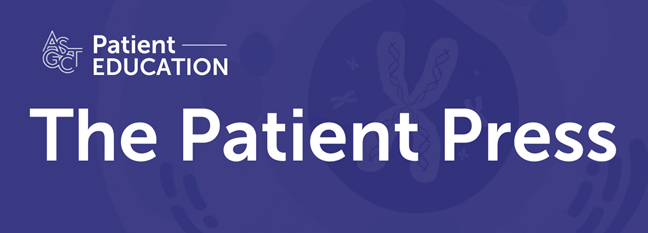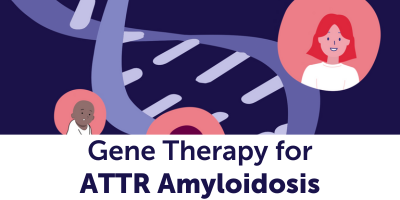December 2024
Providing timely updates for the patient advocate community!
Subscribe to The Patient Press
In This Issue:

Events

🧬 Empowering Patients 2025: A Cell and Gene Therapies Summit
Register for free to join us virtually on March 12 and 13, and view the full agenda to see our full line-up of speakers! Attendees will hear from and leading clinicians and scientist in the field including Drs. Peter Marks, Paula Cannon, Terry Flotte, Amy Waldman, Ray Wang, and Heather Lau –just to name a few! Help us share this event with patients, caregivers, and advocates, whether they’re new to CGTs, or well into their journey!
⚜️ Join us in New Orleans for ASGCT’s Annual Meeting: May 13-17, 2025
Explore patient advocate opportunities at ASGCT’s 28th Annual Meeting. The Society offers a a complimentary registration program for eligible attendees, discounted exhibitor fees for non-profit organizations, as well as patient-focused sessions and networking opportunities. ASGCT is committed to providing opportunities for patient communities to learn about the latest scientific discoveries, and foster connections to researchers, clinicians, and other advocates in the CGT space.
🙋 Apply to Be a Member of the ASGCT Patient Outreach Committee
Apply today to be part of the committee developing patient outreach materials. The Society seeks foundation leaders, scientists, and clinicians to serve as volunteer leaders who will help shape ASGCT’s programming for the patient community. We are accepting applications for all standing and scientific committees through Jan. 17. Term lengths for individuals accepted during the upcoming cycle begin in June 2025 and end in May 2028.
ASGCT + FDA Workshop on AAV Gene Therapy Immunogenicity Solutions
🧬 Register for the free virtual scientific workshop on Jan. 22 and 23 (9 a.m. - 1 p.m. ET on both days) exploring Class Considerations on Immunogenicity for AAV Gene Therapy Products.
Resource Hub

.aspx?width=300&height=150)
NEW Patient Education Units Explore Hearing Loss, ATTR
👂 Genetic Hearing Loss (GHL)
Genetic changes can impact how one's hearing system develops, but gene therapy is paving the way for innovative treatments. Learn more about the genetic factors contributing to hearing loss and the ongoing research on gene therapies aimed at improving outcomes for individuals interested in potential treatment options.
⚕️ Transthyretin Amyloidosis
Transthyretin amyloidosis (ATTR) is a condition that gradually worsens over time and affects how certain organs work, especially the heart and nerves. This new unit explores the causes of ATTR amyloidosis and how new gene therapies are being developed to potentially slow or stop disease progression.
Help us share this free-to-use content with your networks!
Thank you to Akouos and Regeneron for supporting our Genetic Hearing Loss content and Intellia Therapeutics for supporting the ATTR Amyloidosis module. All support is delivered through unrestricted educational grants, and ASGCT is solely responsible for the content of all Patient Education modules.
⏲️ Community Quick Take: 5-minute answers from experts on timely topics
In partnership with the Focused Ultrasound Foundation, the latest CQT explores the use of high-frequency sound waves to target and treat tissues. Beyond its established clinical uses, focused ultrasound shows promise in gene therapy, particularly for delivering large therapeutic compounds across the blood-brain barrier, a crucial step for treating brain disorders like ALS and Parkinson's disease.
🏛️ Patient Focused Policy Positions
Review summaries of important ASGCT Policy Positions focused on improving and advocating for the public health of individuals with rare diseases or disorders. This 10-minute read will enhance your understanding of policies that may affect your community’s CGT journey.
📰 Latest Research from Breakthroughs in Muscular Dystrophy Event
ASGCT hosted a scientific conference this month on the latest CGT research on muscular dystrophies. View the 15 plain language summaries from abstracts that were presented during this event.
📅 World AIDS Day
Dec. 1 marked World AIDS Day, a time to honor the strength and resilience of those living with HIV/AIDS and to celebrate the groundbreaking efforts of scientists working on innovative treatments. One exciting avenue of research is using cell and gene therapies to tackle HIV. The virus is notoriously difficult to treat because it changes rapidly and hides within immune cells.
Watch a recent Congressional briefing featuring ASGCT President Dr. Paula Cannon and other researchers actively working on CGT approaches to treat HIV. The briefing's audience also heard from Paul Edmonds, one of the only people in the world to be in total HIV remission after he received a bone marrow transplant from a donor with a rare HIV-resistant genetic variant.
📅 Wilson Disease Awareness Day
Check out our resources on Wilson Disease and learn how gene therapy can deliver a new ATP7B gene into cells to help restore proper liver function and remove excess copper in the body. On Dec. 6, we recognized Wilson Disease Awareness Day to honor the dedicated community working to advance understanding and develop therapies for this rare condition.
📣 CBER Ensures Patient Voice Remains Central to Gene Therapy Development
Read a recap of the FDA's Center for Biologics Evaluation and Research (CBER) listening meeting held Sept. 20. Patients and caregivers shared their experiences, concerns, and informational needs on the topic of Patient and Care Partner Perspectives on Safety Considerations for Approved Gene Therapy Treatments. A recording is now available for the second part of this listening session, Patient and Care Perspectives on Early Enrollment into Gene and Cell Therapy Clinical Trials for Rare Diseases. Stay tuned for a recap in the February edition.
🔬 Patient Focused Drug Development Workshop
FDA hosted a virtual public workshop to discuss how patient experiences help with understanding the risks and benefits of treatments, what goes on labels, and other important topics. Experts shared ideas about the best ways to collect and use patient feedback, while addressing challenges and opportunities to the implementation of such changes. FDA has invited stakeholders to submit comments to the public docket through Feb. 11, 2025. An event recording will be available soon.
⭐ National Organization for Rare Disease NEW Living Rare Study and Drug Development Series
The National Organizations for Rare Disorders (NORD) released a new drug development educational series for patients and advocates to better understand their role in the drug development process. In addition, they have started the first ever large-scale study in the U.S. examing how the experiences and challenges of people impacted by rare disease changes over time. Check out the Living Rare Study and consider joining!
Breakthrough Moments
.png)
🔜 Upcoming FDA Decision Dates
Ionis Pharmaceuticals' Olezarsen is an investigational Ligand Conjugated Antisense (LICA) therapy for the treatment of patients with familial chylomicronemia syndrome (FCS). FDA granted Olezarsen Priority Review and is expected to make a decision on its approval by Dec. 19.
📰 Rare in the News
GAO report of FDA’s rare disease efforts – The US Government Accountability Office (GAO) conducted a report of FDA’s activities related to rare disease drug development and approval processes. Some of their key findings related to the agency’s approach on collaborating and receiving input from patient groups to help build staff expertise in reviewing drug applications; how they use flexibility in evidence requirements due to challenges like small patient populations, and how the rare disease hub was created to improve coordination between the Center for Drug Evaluation and Research (CDER) and the Center for Biologics Evaluation and Research (CBER).
Alzheimer’s disease - Positive results were reported from the first-ever gene therapy to target the underlying genetic cause of APOE4-associated Alzheimer’s disease by reducing harmful brain proteins linked to the disease.
AADC deficiency – FDA approved PTC Therapeutics’ gene therapy Kebilidi (marketed as Upstaza in the EU), an AAV based gene therapy for the treatment of children and adults with aromatic L-amino acid decarboxylase (AADC) deficiency.
Batten disease* – A gene therapy program for CLN5 Batten disease was halted after the FDA rejected its application for Regenerative Medicine Advanced Therapy (RMAT) designation. The decision significantly impacts patients with this rare neurodegenerative condition, as NGN-101 was the only investigational gene therapy in clinical trials for this subtype.
Duchenne muscular dystrophy* – STAT reported on promising early results from Regenxbio’s experimental gene therapy for DMD. Key findings included improved muscle function in a small group of boys aged 4–12. The therapy delivers microdystrophin, a lab-engineered protein, designed to mimic and potentially outperform natural dystrophin in durability and effectiveness.
Fabry disease* – Sangamo Therapeutics announced they will seek accelerated approval for their Fabry disease gene therapy; the company also said that FDA may not require a confirmatory trial.
Huntington's disease (HD) * – FDA agreed Phase I/II trial data may support a Biologics License Application (BLA) for Accelerated Approval, marking a key milestone for the HD community, paving the way for a potentially life-changing therapy for this devastating neurodegenerative disorder.
AL leukemia* – FDA approved Aucatzyl, the second CAR T-treatment for adults with B-cell precursor acute lymphoblastic leukemia (ALL). It targets the same protein as a prior approved drug for ALL, but is engineered to offer better safety and efficacy. Additionally, FDA announced they are reconsidering the boxed warning on CAR T products on the risk of secondary cancers.
Methylmalonic acidemia (MMA) – Thanks to a collaboration between NCATS and NHGRI, a halted gene therapy project for methylmalonic acidemia (MMA), a rare and life-threatening genetic disorder, is back on track. NIH has stepped in to lead the clinical trial which is expected to launch next year, after financial challenges ended Selecta Biosciences’ involvement.
Rett syndrome - One patient died in Neurogene's trial of a Rhett syndrome treatment after experiencing a rare and life-threatening immune response that can occur with high doses of AAV gene therapy. No other serious adverse events have been reported in the trial. ASGCT will be releasing patient education focused around AAV immune responses throughout 2025.
Sickle Cell Disease* – Beam Therapeutics announced that a patient died in their trial of a gene editing trial for sickle cell disease (SCD). Investigators determined that the death was likely due to the busulfan conditioning treatment received prior to the therapy to prepare the bone marrow for the reinfusion of edited cells. Early results from other patients in the trial were broadly positive, however, and Beam announced they are working on a solution to eliminate the need for busulfan conditioning.
*Learn more
Visit ASGCT's patient-friendly resources on gene therapy for these diseases:
Stay up to date on the latest patient-focused resources, events, and more by subscribing to this newsletter and/or forwarding to someone who might be interested.
Subscribe to The Patient Press